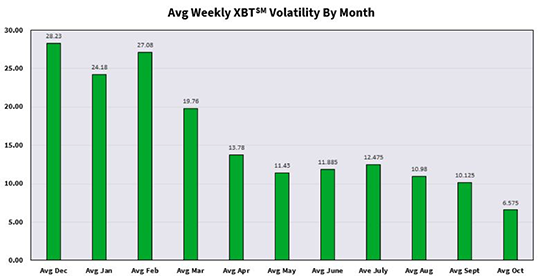Latest news about Bitcoin and all cryptocurrencies. Your daily crypto news habit.

With the continued sideways trading of Bitcoin, the volatility of its futures trading recently reached its lowest level. Presently, the cryptocurrency market, in general, shows more stability than the traditional asset marketplace.
Decline Bitcoin Futures Volatility
According to Kevin Davitt of Cboe Global Markets, the volatility of Bitcoin (BTC) 00 futures continues to narrow. Commenting on the matter, the senior instructor at Cboe’s Options Institute, said:
As it turns out, [bitcoin] XBT futures and cryptos, in general, are moving with very little speed. The week ending Oct. 26th was the least volatile since futures were introduced nearly a year ago. Furthermore, the average weekly [volatility] for XBT futures in October was around 6.6%, which is way below the average of 15.65% since inception.
This trend is similar to what obtains in the spot trading arena where BTC continues to trade in tight ranges. However, while there seems to be retail investor fatigue, Bitcoin futures trading volume has been on the up recently. In October, Bitcoinist reported that CME Bitcoin futures trading increased by 41 percent in Q3 2018.
In a tweet posted on Monday, Mati Greenspan, Senior Market Analyst at eToro offered his view on the implications of Bitcoin’s prolonged flat price action. According to Greenspan:
The flat price action of late is a clear testament to the increased liquidity and maturity of the market and serves as a wide sweeping lesson that eventually price discovery works for all assets.
Elsewhere in the cryptocurrency market, altcoins began Monday showing a mixed bag of 24-hour price gains. Recent price rallies for Bitcoin Cash and Dash today gave way for downward price movements.
Cryptocurrency and Equity on Diverging Paths
With futures trading indicative of Bitcoin volume on Wall Street, the declining volatility is yet another pointer to the divergence between cryptocurrency and the mainstream asset market. Commenting on the issue, Davitt also said:
The waning cryptocurrency volatility is arguably even more interesting against the backdrop of escalating global equity volatility.
October 2018 ushered in future troubles in the stock market as the famed FANG stocks took significant tumbles. The U.S. market lost close to $2 trillion in October as the S&P 500 reached its lowest point in seven years. The present consensus is that the fear of rising interest rates and economic uncertainty in many markets continue to dampen investor confidence.
How long do you think Bitcoin will continue to trade in tight ranges? Let us know your thoughts in the comment section below.
Image courtesy of MarketWatch.
Disclaimer
The views and opinions expressed in this article are solely those of the authors and do not reflect the views of Bitcoin Insider. Every investment and trading move involves risk - this is especially true for cryptocurrencies given their volatility. We strongly advise our readers to conduct their own research when making a decision.

